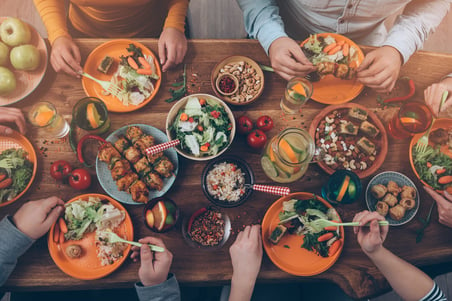
When you have chronic obstructive pulmonary disease, or COPD, eating and digestion can sometimes be a challenge. As your stomach gets full it pushes up against your diaphragm making breathing difficult. The act of chewing and swallowing temporarily cuts the delivery of air to your lungs, making you feel out of breath. Digestion uses a lot of oxygen which can also leave you feeling breathless. Not making the correct food decisions can leave you gasping for breath halfway through your meal.
Those battling COPD often have low energy and loss of appetite. Not eating enough can cause further fatigue and decreased energy levels. A significant amount of people with severe COPD or other lung diseases experience unintended weight loss as their COPD symptoms discourage them from eating.
We have discussed certain essential vitamins for those with COPD but there are also certain foods can increase breathlessness and make digestion even more difficult. There are also many foods that those with lung conditions should avoid because they are likely to increase the risk of exacerbation.
Cold Cuts and Cured Meats
Most cold cut sandwich meats contain additives called nitrates, which help maintain the product’s color and gives the product a longer shelf life. These nitrates can damage the tissue in the lungs of a healthy person as well. If a person with COPD ingests nitrates, it can cause an exacerbation of your disease, resulting in a trip to the hospital for treatment. Types of cold cuts include, but are not limited to:
- Bacon, unless its uncured
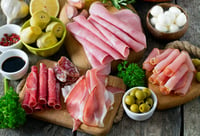
- Salami
- Ham
- Hot dogs
- Bologna
- Any cured cold cuts found in the deli section of a supermarket
Dairy Products
An excess buildup of mucus in the lungs often leads to an exacerbation. Milk paired with your COPD causes this mucus to thicken and increases the severity of your exacerbation. In healthy lungs, the thickened mucus gets coughed up and discarded from the body. This isn’t the case with people with COPD or another lung disease. With limited lung function, your cough response is too weak to properly dispel the thickened mucus. Avoid the following dairy products:
- Cheese
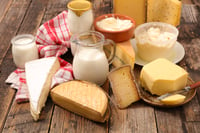
- Ice cream
- Milk
- Yogurt
- Butter
Fried Foods
Fried foods can cause bloating and a buildup of gas, which in turn makes it difficult to breathe. Eating too much fried food also causes weight gain. Weight gain paired with your COPD puts an enormous amount of pressure on your diaphragm. The added pressure makes it harder for you to breathe. Here are a few fried foods to avoid
- Fried chicken
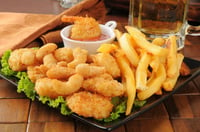
- Fried fish
- Onion rings
- French fries
- Anything deep fried
Carbonated Beverages
Drinking carbonated beverages contributes to gas and bloating. Sugared carbonated beverages also dehydrate you, causing you to drink more which increases bloating and gas and adds abdominal pressure to the mix. People with COPD list carbonated beverages as one of the hardest foods to give up. Your lungs will thank you if you reach for a glass of water or juice to quench your thirst. Please avoid the following carbonated beverages:
- Soda

- Sparkling wine
- Sparking water
- Beer
- Sparkling cider
Cruciferous Vegetables
It’s a big word, but cruciferous simply means “from the cabbage family”. These types of vegetables can increase gas and mixed with your COPD can cause abdominal pressure and make it difficult to breathe. Finding which vegetables to eat may require some trial and error, as people react differently to cruciferous vegetables. Limit your intake of the following:
- Broccoli
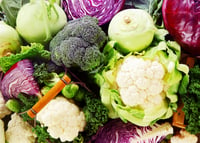
- Cauliflower,
- Bok choy
- Radishes
- Brussel sprouts
Salty Foods

A little salt may be okay from time to time, but a heavy salt diet and your COPD doesn’t mix. Salt can cause you to retain fluid, feel bloated, and put unnecessary stress on your heart.
The good news is you can still add flavor to your foods and help your COPD. There are many herbs that are known to help lung function.
- Peppermint contains menthol which helps relax muscles in the respiratory tract and reduces inflammation.
- Oregano is reduces the effects of allergens. It acts as a decongestant and histamine reducer.
- Turmeric can help prevent inflammation in the airways and to manage stress brought on by the lack of oxygen in your body.
- Osha Root is considered the best lung support herb. Osha root grows naturally in the Rocky Mountains and Native Americans used it for a number of medicinal purposes. Osha root helps your COPD by increasing circulation to the lungs, similar to antihistamines.
Strategies for Eating with COPD
 Try resting before you eat and only eat when you feel good. Schedule your meals when you feel you have the most energy. It may be tough at first as you’re not only changing what you eat, but also changing when you eat. If you find your energy levels are higher in the morning, eat a big breakfast. If your energy levels are higher in the evening, eat a bigger dinner. Just remember not to eat too late as that might affect your sleep. Be patient and listen to what your body tells you, it will be worth it after a routine is established.
Try resting before you eat and only eat when you feel good. Schedule your meals when you feel you have the most energy. It may be tough at first as you’re not only changing what you eat, but also changing when you eat. If you find your energy levels are higher in the morning, eat a big breakfast. If your energy levels are higher in the evening, eat a bigger dinner. Just remember not to eat too late as that might affect your sleep. Be patient and listen to what your body tells you, it will be worth it after a routine is established.
Some other strategies to help you include:
- Eat 5-6 smaller meals a day instead of 3 larger meals
- Eat slowly and take the time to chew your food
- Try to keep breathing even and regulated while eating
- If you need to, take a break
- Sit up as straight as you can to give lungs room to expand
- To add calories and nutrients, drink smoothies or eat soup if chewing is difficult
You may be feeling overwhelmed with all the restrictions and changes to lifelong eating habits. It is normal to feel this way and for you to understand that this will take time. Some of the above foods may not bother you and you can still eat them. Everybody’s body is unique and will respond to these foods differently. Dedicating yourself to eating healthier will help you to better control your COPD, and ultimately will improve your quality of life. If eating is becoming a problem speak to your doctor or respiratory therapist.



